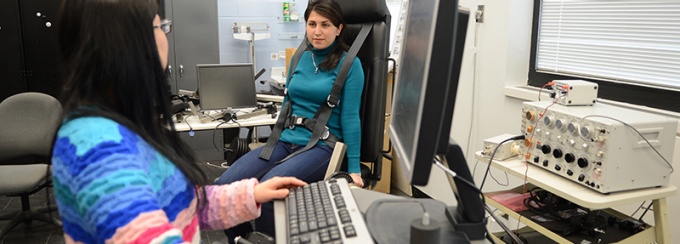Human Factors and Ergonomics
Human factors and ergonomics applies industrial engineering, physiology, psychology, and computer science to the design of working and living environments with explicit consideration of the physical and mental characteristics of users.

ISE students can complete MS research in areas such as human-automation interaction, interaction design, mathematical modeling of human performance, human reliability, industrial safety, workplace design, cognitive engineering, and biomechanics.
Sponsored human factors engineering research is funded by such agencies as the U.S. Air Force, the Federal Aviation Administration, the National Science Foundation, the National Institute for Occupational Safety and Health, the National Institute on Disability, Independent Living, and Rehabilitation Research, Agency for Healthcare Research and Quality and the National Institutes of Health, as well as national and local corporations. Our research domains extend from aviation to manufacturing and the service industries.
The Department of Industrial and Systems Engineering at UB has a 50-year history of quality education and research in the area of human factors. Our program is one of the few graduate programs offered within an engineering school to be accredited by the Human Factors and Ergonomics Society.
Our interdisciplinary work not only solves applied problems, but also enriches our research base. We have an active student body, as evidenced by our award-winning student chapter of the Human Factors and Ergonomics Society. Our alumni regularly take human factors positions in academic institutions, federal laboratories, and national corporations.
The Human Factors/Ergonomics core qualifying exam questions are the following:
- IE 507, IE 531
- IE 532 or IE 536 or 600 level HF courses (choose 3)
MS students who wish to focus their research in the area of human factors should take the following courses:
Fundamental Research Courses (6 credits):
- IE 531 Research Methods (3 credits)
- IE 507 Design and Analysis of Experiments (3 credits)
Content Courses (9 credits—choose 3 of these 4):
- IE 532 Human Information Processing
- IE 535 Human-Computer Interaction
- IE 541 Human Factors in Safety
- IE 536 Work Physiology
Human Factors Research: Students can conduct HFE research through a variety of methods including completing of a formal thesis (3-6 credits*), completing research in an applied setting (usually as an independent study), or performing research activities completed during research assistantship work. Students who conduct research without completing a thesis are required to take the Comprehensive Exam.
*The 3-credit thesis option exists to allow students who complete a thesis flexibility to take an additional content course. It does not impact the expectations for the scope and effort of the thesis.
Students with an interest in human factors/ergonomics may also be interested in the following opportunity: